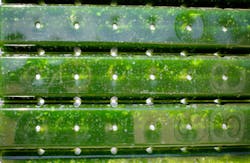Microalgae can be used to make asphalt, according to a new study.
Microscopic algae are already used to make products such as cosmetic dyes and food supplements and are recognized as a promising alternative to petroleum that does not compete for resources used in the food industry. The development of efficient, cost-effective processes could lead to a variety of useful microalgae derivatives, according to France's Centre National de la Recherche Scientifique (National Center for Scientific Research, or CNRS).
The new study involved researchers from a number of French institutions. They found that, although the chemical composition is completely different, bioasphalt has similarities to the traditional asphalt used to pave roads.
Working in laboratories in Nantes and Orléans, the scientists used a hydrothermal liquefaction process, i.e. pressurized water (in a subcritical state), to transform microalgae waste into a black, viscous, hydrophobic substance that closely resembles petroleum-derived asphalt. The process currently achieves a conversion efficiency of 55 percent.
Bioasphalt is liquid at temperatures exceeding 100 degrees C and can be used to coat mineral aggregates. It is viscoelastic at -20 degrees C to 60 degrees C, ensuring the cohesion of the granular structure while supporting mechanical loads and relaxing stress.
Trials are now being conducted to analyze the material's behavior over time, as well as cost-effectiveness studies to evaluate its potential for large-scale production, CNRS said.
The findings of the study have been published in the April issue of ACS Sustainable Chemistry & Engineering, a journal of the American Chemical Society.
